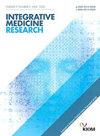Pharmacopuncture for patients with psychological stress caused by traffic accidents: A pragmatic randomized controlled pilot trial
IF 3
4区 医学
Q2 INTEGRATIVE & COMPLEMENTARY MEDICINE
引用次数: 0
Abstract
Background
The effectiveness and safety of stress-focused pharmacopuncture in patients experiencing psychological stress following a traffic accident remain unclear. We aimed to conduct a randomized controlled trial to determine the effectiveness and safety of pharmacopuncture for these patients.
Methods
A total of 50 patients were included in this randomized controlled pilot trial. Inpatients who scored ≥8 on the Hospital Anxiety and Depression Scale-Anxiety (HADS-A) or Depression (HADS-D) subscales following a traffic accident were randomized to receive either integrative Korean medicine (IKM) treatment alone (comparison group) or IKM treatment combined with stress-focused pharmacopuncture (pharmacopuncture group). The primary outcomes were the changes in the Hospital Anxiety and Depression Scale (HADS) scores, HADS total score (HADS-T), HADS-A, and HADS-D, from baseline to discharge. Secondary outcomes included the Numeric Rating Scale (NRS) for anxiety, depression, and physical pain; the Korean version of the Impact of Event Scale-Revised (IES-R-K); the Korean version of the Insomnia Severity Index (ISI-K); the EuroQol 5-Dimension (EQ-5D); and the Patient Global Impression of Change (PGIC) score.
Results
Compared to the comparison group, the pharmacopuncture group showed statistically significant improvements in the HADS-T (difference: 2.30, 95 % CI 0.53 to 4.07), HADS-A (difference: 1.09, 95 % CI 0.17 to 2.02), HADS-D (difference: 1.25, 95 % CI 0.25 to 2.25), NRS of anxiety (difference: 0.85, 95 % CI 0.10 to 1.59), and PGIC (difference: 0.52, 95 % CI 0.07 to 0.97) at the primary endpoint. No serious adverse events were reported.
Conclusion
Stress-focused pharmacopuncture may alleviate anxiety and depression symptoms and potentially accelerate recovery after traffic accidents.
Trial registration
ClinicalTrials.gov, NCT06107777.
药物穿刺治疗交通事故引起的心理应激:一项实用的随机对照试验
背景:压力聚焦药物穿刺治疗交通事故后心理应激患者的有效性和安全性尚不清楚。我们的目的是进行一项随机对照试验,以确定药物穿刺对这些患者的有效性和安全性。方法随机对照试验共纳入50例患者。交通事故后医院焦虑抑郁量表-焦虑(HADS-A)或抑郁(HADS-D)亚量表得分≥8分的住院患者被随机分为单独接受韩国中西医结合(IKM)治疗(对照组)或IKM治疗联合以压力为重点的药物穿刺治疗(药物穿刺组)。主要结局是医院焦虑和抑郁量表(HADS)评分、HADS总分(HADS- t)、HADS- a和HADS- d从基线到出院的变化。次要结局包括焦虑、抑郁和身体疼痛的数值评定量表(NRS);韩国版事件影响量表修订版(IES-R-K);韩国版失眠严重程度指数(ISI-K);EuroQol 5维(EQ-5D);以及患者整体变化印象(PGIC)评分。结果与对照组相比,药物穿刺组在主要终点的HADS-T(差异:2.30,95% CI 0.53 ~ 4.07)、HADS-A(差异:1.09,95% CI 0.17 ~ 2.02)、HADS-D(差异:1.25,95% CI 0.25 ~ 2.25)、焦虑NRS(差异:0.85,95% CI 0.10 ~ 1.59)和PGIC(差异:0.52,95% CI 0.07 ~ 0.97)方面均有统计学意义的改善。无严重不良事件报告。结论压力焦点药物穿刺可减轻交通事故后的焦虑和抑郁症状,并有可能促进康复。临床试验注册:clinicaltrials .gov, NCT06107777。
本文章由计算机程序翻译,如有差异,请以英文原文为准。
求助全文
约1分钟内获得全文
求助全文
来源期刊

Integrative Medicine Research
Medicine-Complementary and Alternative Medicine
CiteScore
6.50
自引率
2.90%
发文量
65
审稿时长
12 weeks
期刊介绍:
Integrative Medicine Research (IMR) is a quarterly, peer-reviewed journal focused on scientific research for integrative medicine including traditional medicine (emphasis on acupuncture and herbal medicine), complementary and alternative medicine, and systems medicine. The journal includes papers on basic research, clinical research, methodology, theory, computational analysis and modelling, topical reviews, medical history, education and policy based on physiology, pathology, diagnosis and the systems approach in the field of integrative medicine.
 求助内容:
求助内容: 应助结果提醒方式:
应助结果提醒方式:


